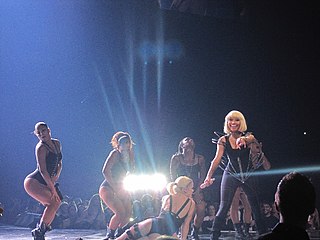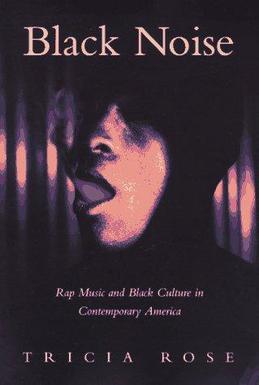Related Research Articles

Advanced Chemistry is a German hip hop group from Heidelberg, a scenic city in Baden-Württemberg, South Germany. Advanced Chemistry was founded in 1987 by Toni L, Linguist, Gee-One, DJ Mike MD and MC Torch. Each member of the group holds German citizenship, and Toni L, Linguist, and Torch are of Italian, Ghanaian, and Haitian backgrounds, respectively.
French hip hop is the hip hop music style developed in French-speaking countries. France is the second largest hip-hop market in the world after the United States.

The Universal Zulu Nation is an international hip hop awareness group formed by and formerly led by hip hop artist Afrika Bambaataa.

Hip hop or hip-hop is a culture and art movement that was created by African Americans pioneered from Black American street culture, also known as hip hop African American culture, that had been around for years prior to its more mainstream discovery while later reaching other groups such as Latino Americans and Caribbean Americans, starting in the Bronx, New York City. Hip Hop is one of cultural movements that has been shaped and dominated by African American males though female hip hop artists have contributed to the art form and culture as well. Hip hop culture is characterized by the key elements of rapping, DJing and turntablism, and breakdancing. Other elements include historical knowledge of the movement, graffiti, beatboxing, street entrepreneurship, hip hop language, and hip hop fashion.
Fun-Da-Mental is a British multi-ethnic hip-hop–ethno-techno–world fusion music group formed in 1991. The group is notable for its energetic fusion of Eastern and Western musical forms, for its outspoken political stance, and for its strong Islamic affiliation and advocacy. Fun-Da-Mental's political stance has led to the group earning the label "the Asian Public Enemy". The group's work has led to international attention and collaborations with artists from Pakistan, South Africa and Siberia.
Golden age hip hop is mainstream hip hop music created from the mid-1980s to the early-mid 1990s, particularly by artists and musicians originating from the New York metropolitan area. A precursor to the new school hip hop movement, it is characterized by its diversity, quality, innovation and influence on hip hop after the genre's emergence and establishment in the old-school era, and is associated with the development and eventual mainstream success of hip hop. There were various types of subject matter, while the music was experimental and the sampling from old records was eclectic.

A video vixen is a female model who appears in hip hop-oriented music videos. From the 1990s to the early 2010s, the video vixen image was a staple in popular music, particularly within the genre of hip hop. The video vixen first came around in the late 1980s when the hip-hop culture began to emerge into its own lifestyle, although was most popular in American popular culture during the 1990s and 2000s. Many video vixens are aspiring actors, singers, dancers, or professional models. Artists and vixens have been criticized for allegedly contributing to the social degradation of black women. Latinas are also degraded and hyper-sexualized in hip hop music videos because they are seen as objects of sexual desire in rap music videos.
Hip hop activism is a term coined by the hip hop intellectual and journalist Harry Allen. It is meant to describe an activist movement of the post- baby boomer generation.

Political hip hop is a subgenre of hip hop music that was developed in the 1980s as a way of turning hip hop into a form of political activism. Political hip hop generally uses the medium of hip hop music to comment on sociopolitical issues and send political messages to inspire action, create social change, or to convince the listener of a particular worldview. It was inspired partially by politically-focused 1970s artists such as The Last Poets and Gil Scott-Heron, as well as the Black Power movement and revolutionary politics of the 1960s and 1970s. Various hip hop artists emerged in the 1980s espousing political messages and providing social and political commentary, with the American group Public Enemy in particular establishing themselves as one of the first predominantly political hip hop groups. The genre has helped to create a new form of social expression for subordinate groups to speak about their exclusions, injustices, and lack of power.
"True to the Game" is the final single from Ice Cube's Death Certificate album.
Misogyny in rap music refers to lyrics, videos, or other aspects of rap music that support, glorify, justify, or normalize the objectification, exploitation, or victimization of women. It is an ideology that portrays women as objects for men's ownership, use, or abuse. It diminishes women to expendable beings. It can range from innuendoes to stereotypical characterizations and defamations.

Tricia Rose is an American sociologist and author who pioneered scholarship on hip hop. Her studies mainly probe the intersectionality of pop music and gender. Now at Brown University, she is a professor of Africana Studies and is the director of the Center for Study of Race and Ethnicity in America. Rose also co-hosts a podcast, The Tight Rope, with Cornel West.
Hip hop feminism is a sub-set of black feminism that centers on intersectional subject positions involving race and gender in a way that acknowledges the contradictions in being a black feminist, such as black women's enjoyment in hip hop music and culture, rather than simply focusing on the victimization of black women in hip hop culture due to interlocking systems of oppressions involving race, class, and gender.
Adam Bradley is an American literary critic, professor, and a writer on popular culture. He is the author or editor of six books. Bradley has written extensively on song lyrics as well as on the literature and legacy of the American novelist Ralph Ellison. His commentary has appeared in The New York Times, The Wall Street Journal, The Washington Post and in numerous other publications. He is a professor of English at the University of California, Los Angeles where he directs the Laboratory for Race & Popular Culture.
Feminist activism in hip hop is a feminist movement based by hip hop artists. The activism movement involves doing work in graffiti, break dancing, and hip hop music. Hip hop has a history of being a genre that sexually objectifies and disrespects women ranging from the usage of video vixens to explicit rap lyrics. Within the subcultures of graffiti and breakdancing, sexism is more evident through the lack of representation of women participants. In a genre notorious for its sexualization of women, feminist groups and individual artists who identify as feminists have sought to change the perception and commodification of women in hip hop. This is also rooted in cultural implications of misogyny in rap music.
Progressive rap is a broad subgenre of hip hop music that aims to progress the genre thematically with socially transformative ideas and musically with stylistic experimentation. Developing through the works of innovative US hip hop acts during the 1980s and 1990s, it has also been known at various points as conscious, underground, and alternative hip hop.

Black Noise: Rap Music and Black Culture in Contemporary America is a 1994 book by Tricia Rose. It was released in hardback on April 29, 1994 through Wesleyan University Press.

Evelyn McDonnell is an American writer and academic. Writing primarily about popular culture, music, and society, she "helped to forge a new kind of feminism for her generation." She is associate professor of journalism and new media at Loyola Marymount University.
Ratchet feminism emerged in the United States from hip hop culture in the early 2000s, largely as a critique of, and a response to, respectability politics. It is distinct from black feminism, womanism, and hip hop feminism. Ratchet feminism coopts the derogatory term (ratchet). Other terms used to describe this concept include ratchet womanism as used by Georgia Tech professor Joycelyn Wilson or ratchet radicalism used by Rutgers professor Brittney Cooper. Ratchet is an identity embraced by many millennials and Gen Z black women and girls. The idea of ratchetness as empowering, or of ratchet feminism, has been articulated by artists and celebrities like Nicki Minaj, City Girls, Amber Rose, and Junglepussy, scholars like Brittney Cooper and Mikki Kendall, and through events like Amber Rose's SlutWalk.
Dr. Gwendolyn D. Pough (1970s) is an American academic and scholar in rhetoric and composition studies. She is a post-Civil Rights African-American academic who developed as a writer during the rise of hip-hop culture.
References
- 1 2 3 4 Miller, Monica; Hodge, Daniel White; Coleman, Jeffery; Chaney, Cassandra (2014). "The Hip in Hip Hop: Toward a Discipline of Hip Hop Studies" (PDF). Journal of Hip Hop Studies. 1 (1).
- 1 2 3 Forman, Murray; Neal, Marc Anthony, eds. (2004). That's the Joint: The Hip Hop Studies Reader (1 ed.). New York: Routledge. ISBN 978-0415969192.
- 1 2 3 4 Watkins, S. Craig (2005). Hip Hop Matters: Politics, Pop Culture, and the Struggle for the Soul of the Movement . Boston: Beacon Press. ISBN 0807009822.
- 1 2 Watkins, S. Craig (2005). "Chapter Nine: Artificial Intelligence?". Hip Hop Matters: Politics, Pop Culture, and the Struggle for the Soul of the Movement . Boston: Beacon Press. p. 234. ISBN 0807009822.
- ↑ Forman, Murray (19 January 2005). "'That's The Joint': A Scholarly Study of Hip-Hop". NPR. Retrieved 26 April 2015.
- ↑ Dyson, Michael Eric (2010). Know What I Mean? Reflections on Hip Hop. New York: Basic Civitas Books.
- 1 2 3 Dimitriadis, Greg (2015). "Framing Hip Hop: New Methodologies for New Times". Urban Education. 50 (1): 31–51. doi:10.1177/0042085914563185.
- 1 2 3 Rose, Tricia (1994). Black Noise: Rap Music and Black Culture in Contemporary America. Wesleyan University Press.
- ↑ Drake, DJ Bobby. "Hip Hop Archive & Research Institute". Hip Hop Archive. Retrieved 22 April 2015.
- ↑ Forman, Murray; Neal, Marc Anthony, eds. (2011). That's the Joint!: The Hip Hop Studies Reader (2 ed.). New York: Routledge.
- 1 2 3 4 5 Woldu, Gail Hilson (1 September 2010). "The Kaleidoscope of Writing on Hip-Hop Culture". Notes. 67 (1): 9–38. doi:10.1353/not.2010.0031.
- ↑ Rose, Tricia (1994). Black Noise: Rap Music and Black Culture in Contemporary America. Introduction: Wesleyan University Press. p. xiii.
- 1 2 3 4 Chang, Jeff (2005). Can't Stop Won't Stop: A History of the Hip-Hop Generation . New York: St. Martin's Press. ISBN 0-312-42579-1.
- 1 2 Chang, Jeff (2005). Can't Stop, Won't Stop: A History of the Hip-Hop Generation . New York: St. Martin's Press. p. Rear Cover Text. ISBN 0-312-42579-1.
- 1 2 3 Harmanci, Reyham (2007). "ACADEMIC HIP-HOP? YES, YES Y'ALL". SF Gate.
- ↑ Wasserman, Bonnie (20 September 2012). "Announcing a New Minor in Africana Studies with Concentration in Hip-Hop Cultures at the U of A!". The University of Arizona: College of Humanities Africana Studies. Retrieved 5 March 2015.
- ↑ "Diploma: Hip-Hop Studies". McNally Smith College of Music. 2015. Retrieved 5 March 2015.
- ↑ "Producer J Rawls Joins Tiffin University Team Polar Ent LLC". polarentllc.com. Retrieved 2017-11-17.
- ↑ "Professional Music". Tiffin University. Retrieved 2017-11-17.
- ↑ "BA (Hons) Hip Hop Performance and Production". uwl.ac.uk. Retrieved August 24, 2022.
- ↑ "Top 3 Universities to Study Hip Hop Music". CampusTales. Retrieved 2018-03-06.
- ↑ Home girls make some noise : hip-hop feminism anthology . Pough, Gwendolyn D., 1970-, Neal, Mark Anthony., Morgan, Joan. (First ed.). Mira Loma, Calif.: Parker Publishing, LLC. 2007. ISBN 1600430104. OCLC 123957643.
{{cite book}}: CS1 maint: others (link)